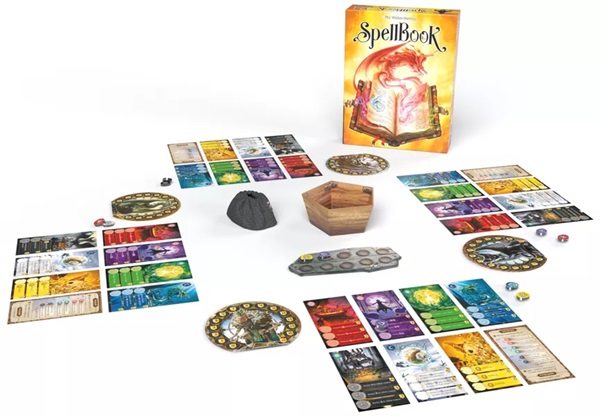Fill Your Spellbook with Powerful Spells and Dynamic Abilities

Take on the role of wizards competing to learn the most powerful spells, through the canny use of abilities, magic tokens, and familiars.
Designed by Phil Walker-Harding (Sushi Go! and Imhotep) and published by Space Cowboys, Spellbook is a 45-minute game for 1-4 players.
Gameplay
Each player takes seven spell cards and lays them out in front of themselves. Everyone has the same set of spells.
On your turn, there are three phases. You may only perform one action per phase. At the start of the game, your options are limited during each phase, but you can always choose to pass on a phase and not perform an action during it. During the morning phase, you can either draw two magic tokens from the token bag or take one from the alter board. During the midday phase, you may choose to place one of your magic tokens on your familiar board. Every familiar has 14 spaces, and the more spaces you fill, the more points it is worth at the end of the game.
During the evening phase, you may learn one spell. To learn a spell, you must discard tokens that are the same color as the spell you are learning. Each spell can be learned at three levels — the easiest level requires three tokens to be discarded, the next level requires four, and the final level requires five. The tokens don’t just come in one of seven colors, they also each have one of three different symbols on them. You can use any three tokens that have the same symbol to act as wild in place of any one colored token.
Most spells unlock new abilities. The higher the level you learn a spell, the more powerful the ability. Some of these are only one-time abilities that trigger when you learn the spell, but most of them unlock new abilities that you can perform during a specific phase of your turn, increasing your options during those phases. Once a spell is learned, you cannot learn it again, even if you have the tokens to learn it at a higher level.
At the end of your turn, you draw new tokens for the altar and play passes to the next person.
The game ends once someone has learned all seven spells or filled all the spaces on his familiar board, and everyone has then had an equal number of turns. Different levels of spells are worth different amounts of points. Players add up the points from their learned spells and their familiar board, and the person with the most points wins the game.

Review
The spells at the heart of the game lead to interesting choices as players plot different paths. The order spells are unlocked, and what level they’re unlocked at, leads to different combinations and powers that complement each other in fun ways. Players can come up with an initial plan of which spells they want to unlock in which order, but those plans have to be adapted based on the tokens drawn.
There’s also a lot of variety. Players only use seven spells in each game, but there are three sets of each color of spell and players can mix and match which spells they use in each game, so long as there’s always one of each color. This leads to different spell combinations and different strategies to consider each game.
However, the start of this game can feel incredibly slow as players just keep passing the bag around, pulling tokens out of it, until they have enough that they can start unlocking spells. Once a couple of spells have been learned, the game really picks up its pace, and it’s fun to see how those abilities evolve and how your options increase once you have different cards unlocked. But that start of the game felt almost annoying at times as players just kept passing the bag back and forth.
The game does look lovely, though. The artwork on the cover alone is atmospheric and beautiful and that continues throughout the spell cards and familiar boards. The acrylic tokens are also solid, attractive, and fun to play with.
Spellbook is an interesting game, with a lot of variety to keep it fresh. Player interaction comes in with having to keep an eye on each other’s progress and adapt accordingly. If someone is unlocking their sixth spell, or nearly filled their familiar board, other players might have to adjust their plans to try and speed up their own progress. It’s a shame the beginning is so slow, but the rest of the game is enjoyable and, for us, mostly made up for that start.
Pros: Great production quality, variety with the number of spells, the unlocking of abilities
Cons: The beginning of the game feels very slow
Disclosure: we received a complimentary review copy of this game.







